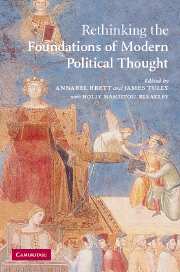Book contents
- Frontmatter
- Contents
- List of contributors
- Preface
- Part I Introduction
- Part II Rethinking the foundations
- 3 Foundations and moments
- 4 Skinner, pre-humanist rhetorical culture and Machiavelli
- 5 Unoriginal authors: how to do things with texts in the Renaissance
- 6 ‘The Best State of the Commonwealth’: Thomas More and Quentin Skinner
- 7 Scholasticism in Quentin Skinner's Foundations
- 8 Scholastic political thought and the modern concept of the state
- 9 ‘So meerly humane’: theories of resistance in early-modern Europe
- 10 Hobbes and democracy
- 11 A lion in the house: Hobbes and democracy
- 12 Hobbes and the foundations of modern international thought
- 13 Surveying The Foundations: a retrospect and reassessment
- Bibliography
- Index
7 - Scholasticism in Quentin Skinner's Foundations
Published online by Cambridge University Press: 19 February 2010
- Frontmatter
- Contents
- List of contributors
- Preface
- Part I Introduction
- Part II Rethinking the foundations
- 3 Foundations and moments
- 4 Skinner, pre-humanist rhetorical culture and Machiavelli
- 5 Unoriginal authors: how to do things with texts in the Renaissance
- 6 ‘The Best State of the Commonwealth’: Thomas More and Quentin Skinner
- 7 Scholasticism in Quentin Skinner's Foundations
- 8 Scholastic political thought and the modern concept of the state
- 9 ‘So meerly humane’: theories of resistance in early-modern Europe
- 10 Hobbes and democracy
- 11 A lion in the house: Hobbes and democracy
- 12 Hobbes and the foundations of modern international thought
- 13 Surveying The Foundations: a retrospect and reassessment
- Bibliography
- Index
Summary
Quentin Skinner blends scholarship with lightness of touch, and to do him justice one would have to be able to match both. The mildly revisionist comments on his account of scholasticism that I make in what follows in no way deny the debts that scholarship owes to him. He singles out three contributions which scholasticism made to the ‘foundations’: to the ideology of the republic against the signori, to the theory of popular sovereignty and to constitutionalism, especially its most radical version, and thus indirectly to the identification of the modern state. This was in many respects a dramatic reinterpretation of the character and substance of early-modern political thought. As he has rightly pointed out, the fashionable historiography of Puritanism and constitutionalism at the time he was writing ignored this dimension altogether. And if Skinner's thought has been recruited for various contemporary ideological projects, notably the attempt to find some half-way intellectually respectable pedigree for participative politics, well, he can hardly be blamed for that. In any event, there are many worse things that could be drawn on than Foundations.
All the same, many of the organising ideas employed in Foundations are not problem free, as Skinner readily admits. Leaving aside period pieces like ‘radical’ and ‘genuinely political’, many of the terms he used to designate themes, doctrines, traditions, schools, authorities and ‘ideologies’ are proleptic. Republicanism, constitutionalism, humanism, absolutism are all coinages from the early nineteenth century or thereabouts, like so many other -isms.
- Type
- Chapter
- Information
- Rethinking The Foundations of Modern Political Thought , pp. 113 - 129Publisher: Cambridge University PressPrint publication year: 2006
- 1
- Cited by



